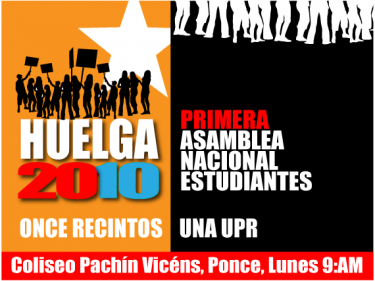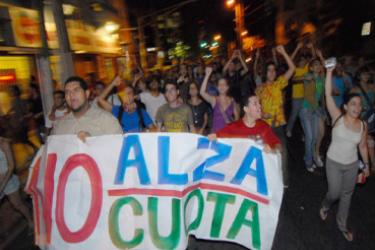It has been described as a historic victory. In a national student assembly, thousands of students of the state-run University of Puerto Rico (UPR) ratified the agreements reached between the students’ National Negotiating Committee (NNC) and the university's administration ending a strike that lasted over 60 days and paralyzed ten of the 11 campuses of the UPR.
Some of the central agreements are [ES]: the UPR's administration will not incur in summary disciplinary actions against students who participated in the strike, and the UPR will not impose a special registration fee during the first academic semester that starts in August 2010. Students also approved a “preventive” strike vote in case the Board of Trustees imposes the special fee in January 2011.
The backlash started immediately after the strike was lifted. The pro-statehood governor Luis Fortuño increased the members of the UPR's Board of Trustees from 13 to 17 [ES], giving the government a chance to place members who are politically identified with the ruling party. The Legislature also passed a law that establishes that secret and direct voting is the only mechanism to be used in student assemblies [ES], excluding the system of voting out loud. The UPR and its Board of Trustees decided to proceed with a law suit against 21 student activists [ES], although it had been suspended as part of the court-ordered mediation process (update: the court has rejected the law suit [ES]). Then, the Chief of Staff, Marcos Rodríguez Ema, publicly invalidated the agreements between the students and the UPR's administration -which had been ordered by a court and mediated by an ex judge- saying they were “just a piece of paper.” [ES] Students and other civil society groups have been publicly protesting against these decisions and expressions.
Bloggers are reacting to the end of the strike and the situation of the UPR. The UPR graduate student, blogger, and student activist, Iván Chaar-López, assures this was the first “postmodern strike” [ES] because it relied on decentralized networks, integrated diverse ethics, counted on multiplicity and diversity, and built upon symbolic constructions:
Después de más de ocho semanas de paro y huelga, el movimiento estudiantil logró conquistar sus reclamos. De nada sirvieron
las críticas cínicas del inmovilismo ni la retórica fuertemente parodiada de la “mayoría silente”. No valieron mucho las alusiones a la
falta de gasolina en el tanque porque no se analizó la extensión de la pista. La Huelga Creativa contó, desde su inicio el 21 de abril, con el
apoyo y la solidaridad de grandes sectores de la población y del estudiantado. Si no hubiera sido así, ésta hubiese sido fácilmente
derrotada por los sectores anti-huelga.
UPR Physics professor and blogger Ramón López Alemán also congratulated the students’ movement [ES]:
Parecía imposible. Era una batalla de David contra Goliat. Vergüenza contra dinero. La creatividad contra la propaganda millonaria. La decencia contra la intransigencia. La justicia contra el poder abusivo y descarnado. La verdad barata en YouTube y Radio Huelga contra la hemorragia de mentiras en radio y TV pagadas con fondos públicos. Flores y teatro contra macanas, burlas e insultos.
Y GANARON LOS ESTUDIANTES. Que viva la lucha de los jóvenes…. Así se hace PATRIA.
And the students won. Long live the struggle of the students….This is how we make a country.
On the other hand, blogger Jean Vidal was skeptical about the students’ accomplishments in a post in La Acera [ES]:
El saldo final de 56 días de jugar al Ché Guevara (sin tener la valentía que tenía el Ché) es que la Universidad sigue en su estado crítico. Su solvencia sigue en duda, sus facilidades sin cuidar. Su nómina seguirá devorando fondos que pueden ir a programas y a estudiantes, en vez de pagar por empleados innecesarios, donde tres hacen la labor que puede hacer un empleado. Su burocracia seguirá irritando a miles de ciudadanos y gastarán dinero público sin piedad (y no sólo me refiero a la administración). La Junta de Síndicos seguirá en manos de batatas políticas y muchos profesores (sí, estoy hablando de la APPU) continuarán avanzando sus agendas políticas, en vez de promover una educación para todos los puertorriqueños y no solo para los que siguen su ideología.
Los estudiantes ganaron en una lucha donde el premio desapareció hace tiempo. ¡Qué vivan los estudiantes!
Mientras, la universidad sigue muriendo.
The students won a struggle for which the prize disappeared a long time ago. Long live the students!
In the meantime, the university is still dying.
This post has generated an interesting debate in the comments section [ES].
Please read Global Voices’ Special Coverage of the 2010 student strike in Puerto Rico.








